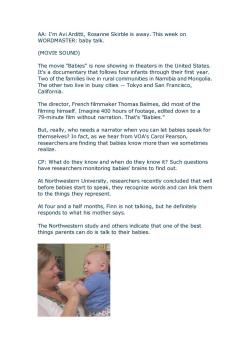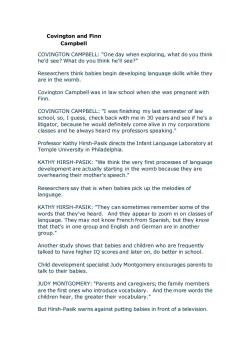《新编大学英语》综合教程(第三版第一册)B1U3_self-market_Listening Material_How to Help Your Baby Learn to Talk Try Talking to Your Baby

AA:I'm Avi Arditti,Rosanne Skirble is away.This week on WORDMASTER:baby talk. (MOVIE SOUND) The movie "Babies"is now showing in theaters in the United States. It's a documentary that follows four infants through their first year. Two of the families live in rural communities in Namibia and Mongolia. The other two live in busy cities --Tokyo and San Francisco, California. The director,French filmmaker Thomas Balmes,did most of the filming himself.Imagine 400 hours of footage,edited down to a 79-minute film without narration.That's "Babies. But,really,who needs a narrator when you can let babies speak for themselves?In fact,as we hear from VOA's Carol Pearson, researchers are finding that babies know more than we sometimes realize. CP:What do they know and when do they know it?Such questions have researchers monitoring babies'brains to find out. At Northwestern University,researchers recently concluded that well before babies start to speak,they recognize words and can link them to the things they represent. At four and a half months,Finn is not talking,but he definitely responds to what his mother says. The Northwestern study and others indicate that one of the best things parents can do is talk to their babies
AA: I'm Avi Arditti, Rosanne Skirble is away. This week on WORDMASTER: baby talk. (MOVIE SOUND) The movie "Babies" is now showing in theaters in the United States. It's a documentary that follows four infants through their first year. Two of the families live in rural communities in Namibia and Mongolia. The other two live in busy cities -- Tokyo and San Francisco, California. The director, French filmmaker Thomas Balmes, did most of the filming himself. Imagine 400 hours of footage, edited down to a 79-minute film without narration. That's "Babies." But, really, who needs a narrator when you can let babies speak for themselves? In fact, as we hear from VOA's Carol Pearson, researchers are finding that babies know more than we sometimes realize. CP: What do they know and when do they know it? Such questions have researchers monitoring babies' brains to find out. At Northwestern University, researchers recently concluded that well before babies start to speak, they recognize words and can link them to the things they represent. At four and a half months, Finn is not talking, but he definitely responds to what his mother says. The Northwestern study and others indicate that one of the best things parents can do is talk to their babies

Covington and Finn Campbell COVINGTON CAMPBELL:"One day when exploring,what do you think he'd see?What do you think he'll see?" Researchers think babies begin developing language skills while they are in the womb. Covington Campbell was in law school when she was pregnant with Finn. COVINGTON CAMPBELL:"I was finishing my last semester of law school,so,I guess,check back with me in 30 years and see if he's a litigator,because he would definitely come alive in my corporations classes and he always heard my professors speaking." Professor Kathy Hirsh-Pasik directs the Infant Language Laboratory at Temple University in Philadelphia. KATHY HIRSH-PASIK:"We think the very first processes of language development are actually starting in the womb because they are overhearing their mother's speech. Researchers say that is when babies pick up the melodies of language. KATHY HIRSH-PASIK:"They can sometimes remember some of the words that they've heard.And they appear to zoom in on classes of language.They may not know French from Spanish,but they know that that's in one group and English and German are in another group." Another study shows that babies and children who are frequently talked to have higher IQ scores and later on,do better in school. Child development specialist Judy Montgomery encourages parents to talk to their babies. JUDY MONTGOMERY:"Parents and caregivers;the family members are the first ones who introduce vocabulary.And the more words the children hear,the greater their vocabulary. But Hirsh-Pasik warns against putting babies in front of a television
Covington and Finn Campbell COVINGTON CAMPBELL: "One day when exploring, what do you think he'd see? What do you think he'll see?" Researchers think babies begin developing language skills while they are in the womb. Covington Campbell was in law school when she was pregnant with Finn. COVINGTON CAMPBELL: "I was finishing my last semester of law school, so, I guess, check back with me in 30 years and see if he's a litigator, because he would definitely come alive in my corporations classes and he always heard my professors speaking." Professor Kathy Hirsh-Pasik directs the Infant Language Laboratory at Temple University in Philadelphia. KATHY HIRSH-PASIK: "We think the very first processes of language development are actually starting in the womb because they are overhearing their mother's speech." Researchers say that is when babies pick up the melodies of language. KATHY HIRSH-PASIK: "They can sometimes remember some of the words that they've heard. And they appear to zoom in on classes of language. They may not know French from Spanish, but they know that that's in one group and English and German are in another group." Another study shows that babies and children who are frequently talked to have higher IQ scores and later on, do better in school. Child development specialist Judy Montgomery encourages parents to talk to their babies. JUDY MONTGOMERY: "Parents and caregivers; the family members are the first ones who introduce vocabulary. And the more words the children hear, the greater their vocabulary." But Hirsh-Pasik warns against putting babies in front of a television

KATHY HIRSH-PASIK:"Children need the interactive back-and-forth. We call it 'reciprocity." Campbell says she likes to sing to her baby. COVINGTON CAMPBELL:"He smiles a lot when we sing to him.He definitely reacts to it,it sort of calms him down a little bit." Carol Pearson,VOA News
KATHY HIRSH-PASIK: "Children need the interactive back-and-forth. We call it 'reciprocity.'" Campbell says she likes to sing to her baby. COVINGTON CAMPBELL: "He smiles a lot when we sing to him. He definitely reacts to it, it sort of calms him down a little bit." Carol Pearson, VOA News
按次数下载不扣除下载券;
注册用户24小时内重复下载只扣除一次;
顺序:VIP每日次数-->可用次数-->下载券;
- 《新编大学英语》综合教程(第三版第一册)B1U3_self-market_Grammar and Vocabulary.doc
- 《新编大学英语》综合教程(第三版第一册)B1U3_English body language.doc
- 《新编大学英语》综合教程(第三版第一册)B1U2_Translation & Writing.ppt
- 《新编大学英语》综合教程(第三版第一册)B1U2_self market_Writing Material_How to Write a Personal Experience.doc
- 《新编大学英语》综合教程(第三版第一册)B1U2_self market_U2B1 QUIZ_Written Quiz_written quiz.doc
- 《新编大学英语》综合教程(第三版第一册)B1U2_self market_U2B1 QUIZ_06 B2U01 Oral Quiz.ppt
- 《新编大学英语》综合教程(第三版第一册)B1U2_self market_Reading Material_课文背景材料.doc
- 《新编大学英语》综合教程(第三版第一册)B1U2_self market_Reading Material_课文翻译及课后练习答案.doc
- 《新编大学英语》综合教程(第三版第一册)B1U2_self market_Reading Material_Remember Me When I am Gone Away.doc
- 《新编大学英语》综合教程(第三版第一册)B1U2_self market_Reading Material_My Personal Experience——-A Funny Memory.doc
- 《新编大学英语》综合教程(第三版第一册)B1U2_self market_Reading Material_Memory Improvement.doc
- 《新编大学英语》综合教程(第三版第一册)B1U2_self market_Reading Material_Memento Transcripts.doc
- 《新编大学英语》综合教程(第三版第一册)B1U2_self market_Reading Material_How To Improve Memory.doc
- 《新编大学英语》综合教程(第三版第一册)B1U2_Read by critical thinking.ppt
- 《新编大学英语》综合教程(第三版第一册)B1U2_Menu.ppt
- 《新编大学英语》综合教程(第三版第一册)B1U2_Activate.ppt
- 《新编大学英语》综合教程(第三版第一册)B1U1_管鲍之交.doc
- 《新编大学英语》综合教程(第三版第一册)B1U1_Translation & Writing.ppt
- 《新编大学英语》综合教程(第三版第一册)B1U1_self market_Writing Material_How to Write a Narrative Story.doc
- 《新编大学英语》综合教程(第三版第一册)B1U1_self market_Writing Material_All About People.doc
- 《新编大学英语》综合教程(第三版第一册)B1U3_self-market_QUIZ_Oral Quiz.ppt
- 《新编大学英语》综合教程(第三版第一册)B1U3_self-market_QUIZ_Written Quiz.doc
- 《新编大学英语》综合教程(第三版第一册)B1U3_self-market_Reading Material_barriers to effective human Communication.doc
- 《新编大学英语》综合教程(第三版第一册)B1U3_self-market_Reading Material_communication famous saying.doc
- 《新编大学英语》综合教程(第三版第一册)B1U3_self-market_Reading Material_How Do I Get Him or Her To Talk To Me.doc
- 《新编大学英语》综合教程(第三版第一册)B1U3_self-market_Reading Material_Unit 3活动.doc
- 《新编大学英语》综合教程(第三版第一册)B1U3_self-market_Reading Material_unit 3活动directions.doc
- 《新编大学英语》综合教程(第三版第一册)B1U3_self-market_Reading Material_第三单元 课文翻译及课后练习答案.doc
- 《新编大学英语》综合教程(第三版第一册)B1U3_self-market_Reading Material_第三单元课文背景材料.doc
- 《新编大学英语》综合教程(第三版第一册)B1U3_self-market_Samples.doc
- 《新编大学英语》综合教程(第三版第一册)B1U3_self-market_Writing Material_How to Get Rid Of Nervousness.doc
- 《新编大学英语》综合教程(第三版第一册)B1U3_self-market_Writing Material_How to Give Advice.doc
- 《新编大学英语》综合教程(第三版第一册)B1U3_U3 Activate.ppt
- 《新编大学英语》综合教程(第三版第一册)B1U3_U3 Menu.ppt
- 《新编大学英语》综合教程(第三版第一册)B1U3_U3 Read by critical thinking.ppt
- 《新编大学英语》综合教程(第三版第一册)B1U3_U3 Translation & Writing.ppt
- 《新编大学英语》综合教程(第三版第一册)B1U4_Activate.ppt
- 《新编大学英语》综合教程(第三版第一册)B1U4_Do it or not, never say I will try.doc
- 《新编大学英语》综合教程(第三版第一册)B1U4_Menu.ppt
- 《新编大学英语》综合教程(第三版第一册)B1U4_Read by critical thinking.ppt
